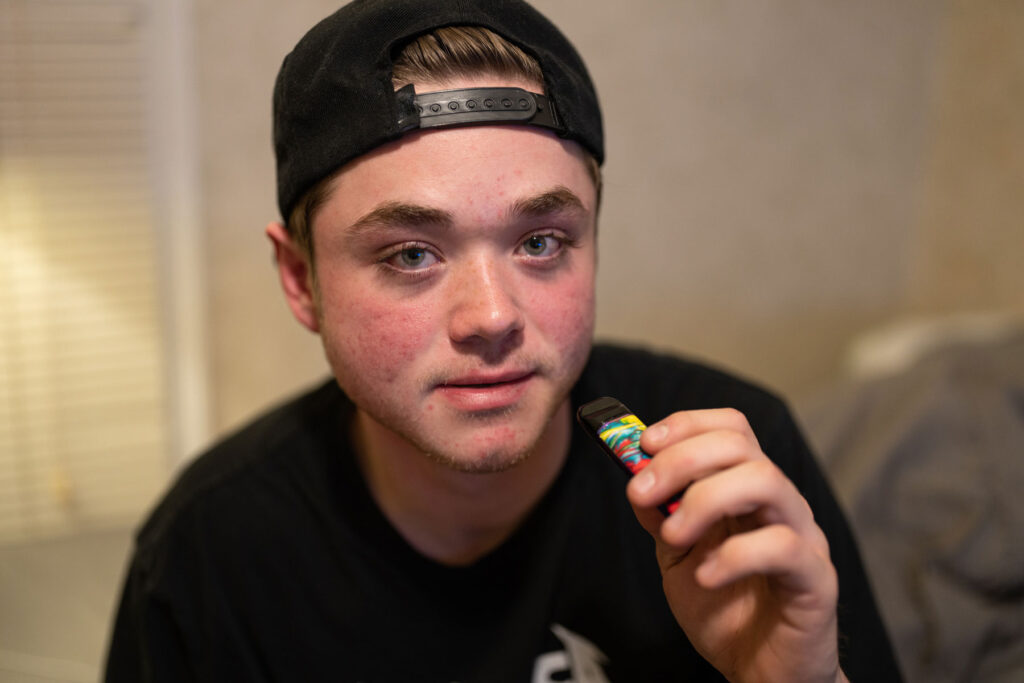Vaping is increasingly popular, especially among teenaged boys. The smoking alternative may seem less harmful than cigarettes and second-hand smoke. However, for both teenagers and adults, vaping can have adverse side effects. Today’s ads encourage teens to vape rather than smoke cigarettes. Unfortunately, vaping can lead to other drug abuse and adverse health effects. Luckily, drug abuse treatment programs now specialize in helping teen boys quit vaping.
If your teen son smokes or vapes, call Foothills at Red Oak Recovery® to learn about our nicotine addiction treatment program. Located in beautiful North Carolina, our programs help adolescent boys regain control of their lives. We can help your teen leave vaping and other substance use behind for good.
What Is Vaping?
Vape or vaping is the term used for electronic cigarettes and vape pens. E-cigarettes contain atomizers that vaporize cartridges of tobacco, marijuana flavors, and other chemicals. A battery powers the atomizer as a person inhales. Instead of inhaling smoke like a cigarette, a user inhales chemical-infused water vapors. This may make vaping seem less harmless than smoking. However, e-cigarettes still release nicotine into the body.
Nicotine immediately affects the heart and blood vessels. It increases blood pressure and stiffens arteries. Over time, nicotine can lead to life-threatening heart problems. Nicotine also increases adrenaline, the chemical our body makes to help fight or flee in life-threatening situations. Constant adrenaline can cause adrenal fatigue and increase the potential for heart problems. Research shows nicotine can be just as addictive as heroin or cocaine. Many e-cigarettes can flood the body with more nicotine than a traditional cigarette. There are even high-concentration cartridges to increase nicotine levels.
What Are Negative Effects of Vaping on Teens?
Today, there’s an increase in teenagers vaping. E-cigarettes are cheaper than regular cigarettes and more easily accessible. Many teens believe vaping is cool and believe that vaping is less harmful than smoking. Other teens may self-soothe with e-cigarettes. Like other drugs, vaping can help teens self-medicate for stress and untreated mental health disorders. Most e-cigarette cartridges are flavored like candy, making them especially appealing to teenagers. Using an e-cigarette or vape pen can cause the following:
- Nausea
- Vomiting
- Diarrhea
- Coughing
- Lung injury
- Popcorn lung
- Shortness of breath
- Headaches
- Increased blood pressure
- Heart attack
- Seizures
- Loss of appetite
- Weight loss
There are many reasons a person may choose to vape. There’s continued social pressure to vape for teenagers, just as there once was to smoke cigarettes. Some smokers may choose to switch from cigarettes to e-cigarettes in an effort to quit smoking or reduce the tar in their lungs. Although vaping does not fill a person’s lungs with smoke, it can still lead to cancer, lung injury, and other serious diseases.
How Can Vaping Lead to Addiction?
Vaping can lead to addiction due to the nicotine in most e-cigarette products. Nicotine is highly addictive and quickly alters the brain’s chemistry, creating dependency. When someone vapes, nicotine enters the bloodstream and triggers the release of dopamine, a chemical tied to pleasure and reward.
Over time, the brain relies on nicotine for dopamine, causing cravings and withdrawal when intake drops. The ease of use and appealing flavors of vape products, especially for teen boys, can encourage frequent use and increase addiction risk. Regular use makes quitting difficult, trapping teens in a cycle of dependence.
Treatment for Teen Vaping at Foothills at Red Oak Recovery®
Foothills at Red Oak Recovery® understands the unique challenges that teenager boys face when it comes to nicotine addiction and vaping. Our tailored programs provide a safe and supportive environment where teen boys can address the physical, emotional, and psychological aspects of their addiction. Using a combination of evidence-based therapies, group support sessions, and holistic practices, we can help your son build the strength and resilience he needs to overcome his vaping habits.
Our approach focuses on meeting teens where they are while empowering them to explore healthier coping mechanisms and lifestyle choices. We also involve families in the recovery process, helping rebuild trust and foster open communication. Foothills at Red Oak Recovery® is fully committed to guiding teen boys toward a brighter, healthier future free from addiction.
Get Support For Teen Vaping at Foothills at Red Oak Recovery®
The effects of teen vaping are still undergoing extensive research in medical labs across the country. If your teen vapes or smokes, their behavior may point to underlying addiction triggers. The team at Foothills at Red Oak Recovery® can help your teen cope with daily stress without e-cigarettes.
Our programs for teenage boys treat a variety of addictions and co-occurring disorders to help teens focus on what really matters in their lives. Our North Carolina campus includes equine therapy to help teen boys reconnect with the world around them. If your son or a young man smokes, don’t wait. Call Foothills today. Reach our friendly and knowledgeable staff by calling 866.300.5275 or using our online contact form to learn more about our addiction treatment programs.

